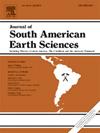巴西最早的晚三叠世一种奇异的横齿类犬齿龙--Protuberum cabralense的颅齿重新解释和新标本
IF 1.7
4区 地球科学
Q3 GEOSCIENCES, MULTIDISCIPLINARY
引用次数: 0
摘要
在巴西南部的三叠纪大陆床中,栉齿龙类是最丰富的四足类群之一,已描述的物种超过 11 个。在这一支系中,卡布拉尔原角龙是最奇特的成员之一,其特征是头骨粗壮,肋骨、髂骨和骶椎前神经棘的背面有圆形突起。主模式和副模式采集于 20 世纪 70 年代,但直到 2009 年才被描述,并被归入贡布多头龙科。在此,我们重新分析了主模式标本的头骨,并重新解释了一些解剖特征,如上门齿的数量、副犬齿窝的位置、后犬齿的数量、翼甲-副枕骨孔的形态等。通过 CT 扫描图像描述了颅内腔,并将其与 Santagnathus mariensis(此处首次描述其颅内腔)和其他横齿兽类进行了比较。此外,还介绍了该物种的两个新发现,增加了其在鼎龙集合区(Pinheiros-Chiniquá序列,最晚拉迪南期-最早卡尼安期)的地理分布及其与生物地层学的相关性。对一些特征的重新解释为卡布拉尔原棘龙提供了一个新的系统发育位置,使其嵌套在巨齿龙科(Gomphodontosuchinae)支系之外,甚至比巨齿龙科更早分化。本文章由计算机程序翻译,如有差异,请以英文原文为准。
Craniodental reinterpretations and new specimens of Protuberum cabralense, a bizarre traversodontid cynodont from the earliest Late Triassic of Brazil
Traversodontid cynodonts form one of the most abundant tetrapod clades in continental Triassic beds of southern Brazil, with more than eleven species described. Within this clade, Protuberum cabralense is one of its most bizarre members, characterized by a robustly built skull and the presence of rounded protuberances in the dorsal surface of the ribs, ilium and neural spines in presacral vertebrae. The holotype and paratypes were collected in the 1970's but described only in 2009, being positioned in the clade Gomphodontosuchinae. Here we reanalyzed the skull of the holotype specimen and reinterpreted some anatomical traits, such as the number of upper incisors, position of the paracanine fossa, number of postcanines, morphology of the pterygo-paraoccipital foramen, among others. Through CT scan images the endocranial cavities are described and compared with Santagnathus mariensis (whose endocranial cavities are firstly described here) and other traversodontids. Also, two new occurrences of the species are presented, increasing its geographical distribution within the Dinodontosaurus Assemblage Zone (Pinheiros-Chiniquá Sequence, latest Ladinian-earliest Carnian) and its relevance to biostratigraphy. The reinterpretation of several traits resulted in a novel phylogenetic placement for Protuberum cabralense, nested outside the Gomphodontosuchinae clade, even as an earlier divergent than massetognathine forms.
求助全文
通过发布文献求助,成功后即可免费获取论文全文。
去求助
来源期刊

Journal of South American Earth Sciences
地学-地球科学综合
CiteScore
3.70
自引率
22.20%
发文量
364
审稿时长
6-12 weeks
期刊介绍:
Papers must have a regional appeal and should present work of more than local significance. Research papers dealing with the regional geology of South American cratons and mobile belts, within the following research fields:
-Economic geology, metallogenesis and hydrocarbon genesis and reservoirs.
-Geophysics, geochemistry, volcanology, igneous and metamorphic petrology.
-Tectonics, neo- and seismotectonics and geodynamic modeling.
-Geomorphology, geological hazards, environmental geology, climate change in America and Antarctica, and soil research.
-Stratigraphy, sedimentology, structure and basin evolution.
-Paleontology, paleoecology, paleoclimatology and Quaternary geology.
New developments in already established regional projects and new initiatives dealing with the geology of the continent will be summarized and presented on a regular basis. Short notes, discussions, book reviews and conference and workshop reports will also be included when relevant.
 求助内容:
求助内容: 应助结果提醒方式:
应助结果提醒方式:


